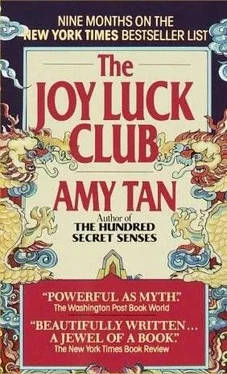But really, the words mean much more than that. Maybe they can't be easily translated because they refer to a sensation that only Chinese people have, as if you were falling headfirst through Old Mr. Chou's door, then trying to find your way back. But you're so scared you can't open your eyes, so you get on your hands and knees and grope in the dark, listening for voices to tell you which way to go.
I had been talking to too many people, my friends, everybody it seems, except Ted. To each person I told a different story. Yet each version was true, I was certain of it, at least at the moment that I told it.
To my friend Waverly, I said I never knew how much I loved Ted until I saw how much he could hurt me. I felt such pain, literally a physical pain, as if someone had torn off both my arms without anesthesia, without sewing me back up.
"Have you ever had them torn off with anesthesia? God! I've never seen you so hysterical," said Waverly. "You want my opinion, you're better off without him. It hurts only because it's taken you fifteen years to see what an emotional wimp he is. Listen, I know what it feels like."
To my friend Lena, I said I was better off without Ted. After the initial shock, I realized I didn't miss him at all. I just missed the way I felt when I was with him.
"Which was what?" Lena gasped. "You were depressed. You were manipulated into thinking you were nothing next to him. And now you think you're nothing without him. If I were you, I'd get the name of a good lawyer and go for everything you can. Get even."
I told my psychiatrist I was obsessed with revenge. I dreamt of calling Ted up and inviting him to dinner, to one of those trendy who's-who places, like café Majestic or Rosalie's. And after he started the first course and was nice and relaxed, I would say, "It's not that easy, Ted." From my purse I would take out a voodoo doll which Lena had already lent me from her props department. I would aim my escargot fork at a strategic spot on the voodoo doll and I would say, out loud, in front of all the fashionable restaurant patrons, "Ted, you're just such an impotent bastard and I'm going to make sure you stay that way." Wham!
Saying this, I felt I had raced to the top of a big turning point in my life, a new me after just two weeks of psychotherapy. But my psychiatrist just looked bored, his hand still propped under his chin. "It seems you've been experiencing some very powerful feelings," he said, sleepy-eyed. "I think we should think about them more next week."
And so I didn't know what to think anymore. For the next few weeks, I inventoried my life, going from room to room trying to remember the history of everything in the house: things I had collected before I met Ted (the hand-blown glasses, the macrame wall hangings, and the rocker I had recaned); things we bought together right after we were married (most of the big furniture); things people gave us (the glass-domed clock that no longer worked, three sake sets, four teapots); things he picked out (the signed lithographs, none of them beyond number twenty-five in a series of two hundred fifty, the Steuben crystal strawberries); and things I picked out because I couldn't bear to see them left behind (the mismatched candlestick holders from garage sales, an antique quilt with a hole in it, odd-shaped vials that once contained ointments, spices, and perfumes).
I had started to inventory the bookshelves when I got a letter from Ted, a note actually, written hurriedly in ballpoint on his prescription notepad. "Sign 4x where indicated," it read. And then in fountain-pen blue ink, "enc: check, to tide you over until settlement."
The note was clipped to our divorce papers, along with a check for ten thousand dollars, signed in the same fountain-pen blue ink on the note. And instead of being grateful, I was hurt.
Why had he sent the check with the papers? Why the two different pens? Was the check an afterthought? How long had he sat in his office determining how much money was enough? And why had he chosen to sign it with that pen?
I still remember the look on his face last year when he carefully undid the gold foil wrap, the surprise in his eyes as he slowly examined every angle of the pen by the light of the Christmas tree. He kissed my forehead. "I'll use it only to sign important things," he had promised me.
Remembering that, holding the check, all I could do was sit on the edge of the couch feeling my head getting heavy at the top. I stared at the x's on the divorce papers, the wording on the prescription notepad, the two colors of ink, the date of the check, the careful way in which he wrote, "Ten thousand only and no cents."
I sat there quietly, trying to listen to my heart, to make the right decision. But then I realized I didn't know what the choices were. And so I put the papers and the check away, in a drawer where I kept store coupons which I never threw away and which I never used either.
My mother once told me why I was so confused all the time. She said I was without wood. Born without wood so that I listened to too many people. She knew this, because once she had almost become this way.
"A girl is like a young tree," she said. "You must stand tall and listen to your mother standing next to you. That is the only way to grow strong and straight. But if you bend to listen to other people, you will grow crooked and weak. You will fall to the ground with the first strong wind. And then you will be like a weed, growing wild in any direction, running along the ground until someone pulls you out and throws you away."
But by the time she told me this, it was too late. I had already begun to bend. I had started going to school, where a teacher named Mrs. Berry lined us up and marched us in and out of rooms, up and down hallways while she called out, "Boys and girls, follow me." And if you didn't listen to her, she would make you bend over and whack you with a yardstick ten times.
I still listened to my mother, but I also learned how to let her words blow through me. And sometimes I filled my mind with other people's thoughts-all in English-so that when she looked at me inside out, she would be confused by what she saw.
Over the years, I learned to choose from the best opinions. Chinese people had Chinese opinions. American people had American opinions. And in almost every case, the American version was much better.
It was only later that I discovered there was a serious flaw with the American version. There were too many choices, so it was easy to get confused and pick the wrong thing. That's how I felt about my situation with Ted. There was so much to think about, so much to decide. Each decision meant a turn in another direction.
The check, for example. I wondered if Ted was really trying to trick me, to get me to admit that I was giving up, that I wouldn't fight the divorce. And if I cashed it, he might later say the amount was the whole settlement. Then I got a little sentimental and imagined, only for a moment, that he had sent meten thousand dollars because he truly loved me; he was telling me in his own way how much I meant to him. Until I realized that ten thousand dollars was nothing to him, that I was nothing to him.
I thought about putting an end to this torture and signing the divorce papers. And I was just about to take the papers out of the coupon drawer when I remembered the house.
I thought to myself, I love this house. The big oak door that opens into a foyer filled with stained-glass windows. The sunlight in the breakfast room, the south view of the city from the front parlor. The herb and flower garden Ted had planted. He used to work in the garden every weekend, kneeling on a green rubber pad, obsessively inspecting every leaf as if he were manicuring fingernails. He assigned plants to certain planter boxes. Tulips could not be mixed with perennials. A cutting of aloe vera that Lena gave me did not belong anywhere because we had no other succulents.
Читать дальше












